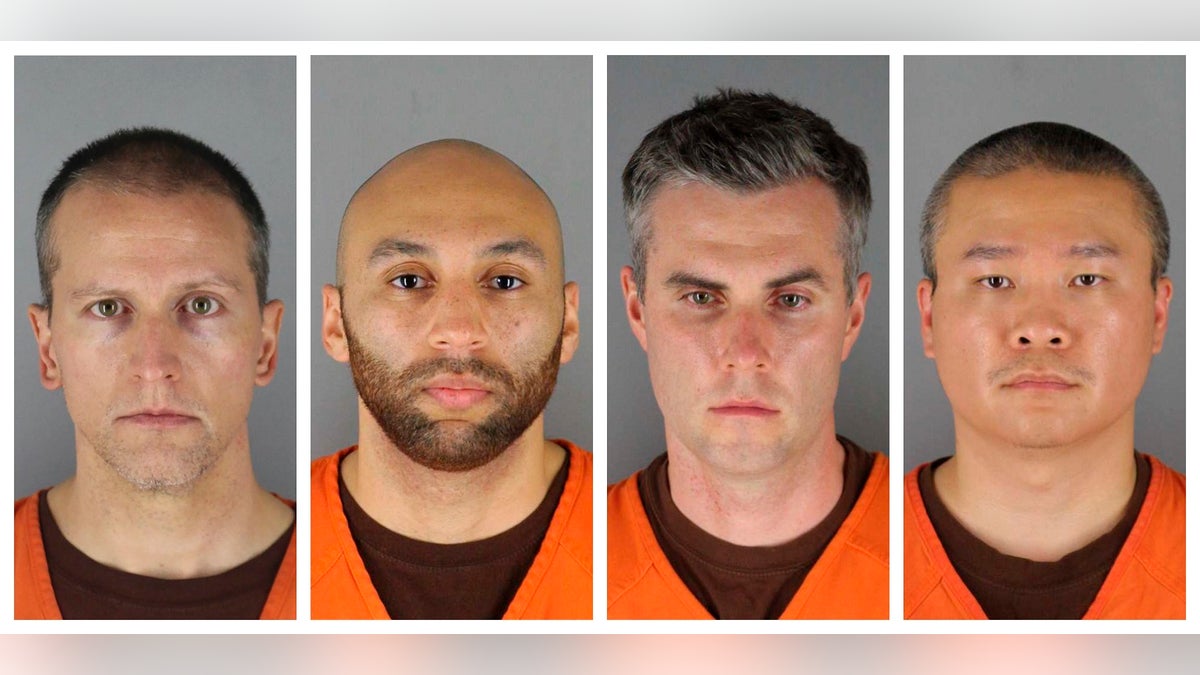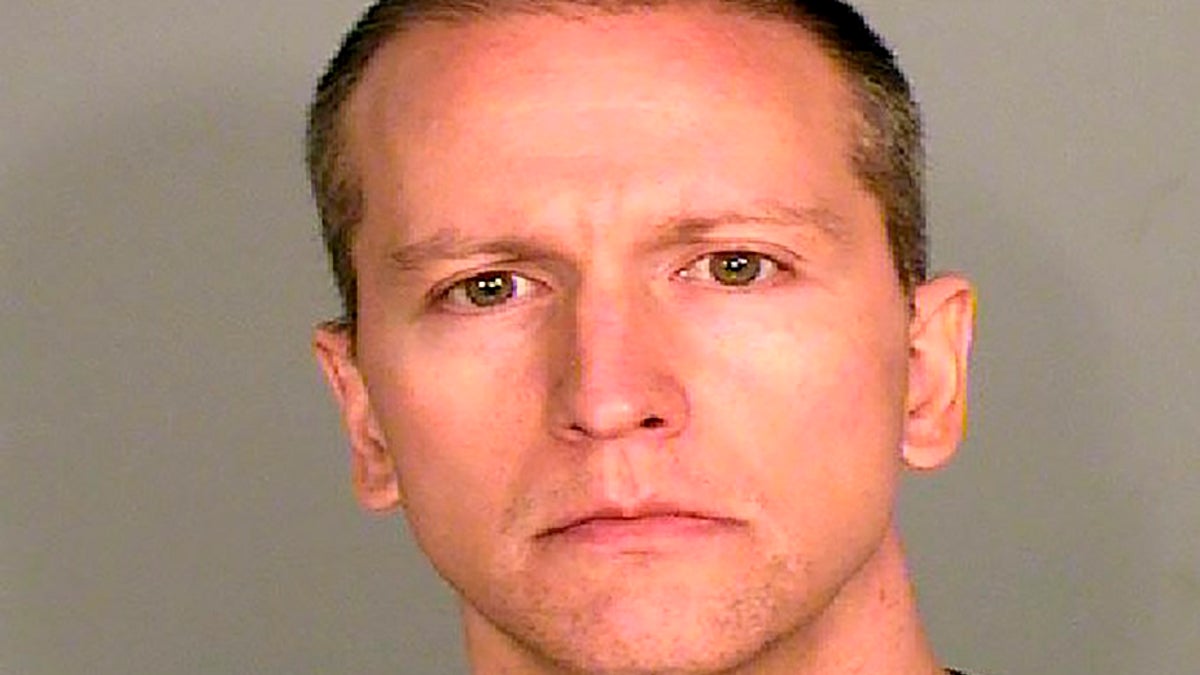4 ex-cops charged in George Floyd’s death appear in court
Protests are underway outside the Minneapolis courthouse, where the four former police officers charged in the death of George Floyd make an appearance; Mike Tobin reports.
The four former Minneapolis police officers charged in connection with George Floyd’s May 25 death were in court on Friday for a hearing to cover issues ranging from the prosecution’s wish to hold a joint trial to defense attorneys’ requests surrounding the prospective jury and the location of the upcoming trial.
Attorneys representing the quartet say each client should get his own trial, as the officers try to diminish their alleged roles in Floyd's death. Meanwhile, prosecutors say all four officers should be tried together because the nature of the charges and evidence is similar and “it is impossible to evaluate any individual defendant’s conduct in a vacuum," they said.
At the start of Friday morning’s hearing, Judge Peter Cahill said he would not discuss any motions for dismissal during that court appearance.
Cahill took most of the issues under advisement but did grant a defense request to remove a local prosecutor from the case.
In addition to the prosecution’s request to hold a joint trial for the four officers, the court heard arguments for and against defense requests to move the trial away from Minneapolis and to sequester the jury and to keep jurors anonymous.
Floyd, who was in handcuffs, died May 25 after Derek Chauvin pressed his knee against his neck as Floyd said he couldn’t breathe and became motionless, as seen in moments captured on video footage. Chauvin is charged with second-degree murder, third-degree murder and manslaughter. Thomas Lane, J. Kueng and Tou Thao are each charged with aiding and abetting both second-degree murder and manslaughter.
Friday was Chauvin’s first appearance inside a physical courtroom. He is in state custody and has attended previous hearings via video.
A reporter for local affiliate FOX9 Minneapolis described how Chauvin, flanked by two deputies, arrived at court wearing a suit, a mask and sporting a buzz cut. He was reportedly not shackled or handcuffed.
He didn’t make eye contact with any of the defendants as he arrived, but Kueng looked at him as he passed and Lane glanced over.
Attorney General Keith Ellison, whose office has taken the lead on prosecution, was seated at one of two prosecution tables in court.
As the hearing began, and through to its conclusion, a few dozen protesters gathered in a street in front of the courthouse that had been blocked off. Many chanted “No justice, no peace.” One carried a Black Lives Matter flag and wore a black helmet with swim goggles around the back of his head. The windows on most nearby buildings were boarded up.
Cahill said Friday that four Hennepin County prosecutors including County Attorney Mike Freeman, who has long been out of favor with local activists for the way his office has handled cases against police officers, will not participate in the trial because they met with the county medical examiner to discuss the autopsy results. Cahill said they could be called as witnesses.
MULTIPLE WORKERS FIRED AFTER GEORGE FLOYD'S MEDICAL RECORDS 'IMPROPERLY ACCESSED'
Prosecutors argued the case should proceed with one trial because the evidence – including witness statements, body-camera video and police department policy on use of force – is similar for each officer. They also say the officers also acted in close concert.
“Here, all four Defendants worked together to murder Floyd: Chauvin, Kueng, and Lane pinned Floyd face-down, while Thao stopped the crowd from intervening, enabling the other Defendants to maintain their positions.
WARNING: THIS MAY CONTAIN GRAPHIC LANGUAGE
Neal Katyal, an outside special attorney who is helping the prosecution, told Cahill on Friday that the “interests of justice” favored one trial because of the extra burden multiple trials would place on the court and witnesses.
“We’re talking about delaying justice for months, if not years,” he said.
Katyal also said the likely heavy publicity over a verdict in a first trial could prejudice the jury pool for later trials. And he expressed worry about the strain multiple verdicts would have on the public.
Attorneys for Lane and Kueng have argued that their clients were rookies, who were following Chauvin’s lead. Thao’s attorney, Bob Paule, has said that his client’s role was “absolutely distinct” from the others, because he was on crowd control and was securing the scene – while the other three restrained Floyd.
Defense attorney Earl Gray, who represents Lane, said Friday one advantage to separate trials would be that if Chauvin is tried first and acquitted, the others would essentially be cleared.

This combination of file photos provided by the Hennepin County Sheriff's Office in Minnesota on Wednesday, June 3, 2020, shows Derek Chauvin, from left, J. Alexander Kueng, Thomas Lane and Tou Thao. (Hennepin County Sheriff's Office via AP)
Chauvin’s attorney, Eric Nelson, wrote in court papers that his client’s case is different. Nelson said prosecutors must prove Chauvin intended to assault Floyd, but they must also show that the other officers knew of Chauvin’s intent before it happened. As a result, he said, Chauvin will have to defend himself differently.
POLICE CHIEFS WHO HAVE RESIGNED OR RETIRED SINCE GEORGE FLOYD DEATH
“The other defendants are clearly saying that, if a crime was committed, they neither knew about it nor assisted in it,” Nelson wrote. “They blame Chauvin.”
But Chauvin also points fingers, according to court documents. Nelson wrote that Lane and Kueng — the officers who responded to a forgery call — initiated contact with Floyd before Chauvin and Thao arrived, and that Chauvin believes Floyd was overdosing on fentanyl.

This photo provided by the Ramsey County Sheriff's Office shows former Minneapolis police Officer Derek Chauvin, who was charged in the Memorial Day death of George Floyd. (Courtesy of Ramsey County Sheriff's Office via AP)
Nelson wrote that while Lane and Kueng called for a paramedic and believed Floyd was “on something,” they didn’t elevate the call to one of more urgency or give medical assistance.
“Instead, they struggled to subdue Mr. Floyd and force him into their squad car, likely exacerbating his condition considerably,” Nelson wrote, adding that Chauvin could reasonably argue that their inaction led to Floyd’s death.
CLICK HERE TO GET THE FOX NEWS APP
“If EMS had arrived just three minutes sooner, Mr. Floyd may have survived,” Nelson wrote. “If Kueng and Lane had chosen to de-escalate instead of struggle, Mr. Floyd may have survived. If Kueng and Lane had recognized the apparent signs of an opioid overdose and rendered aid, such as administering naloxone, Mr. Floyd may have survived.”
Fox News' Matt Finn and The Associated Press contributed to this report.










































